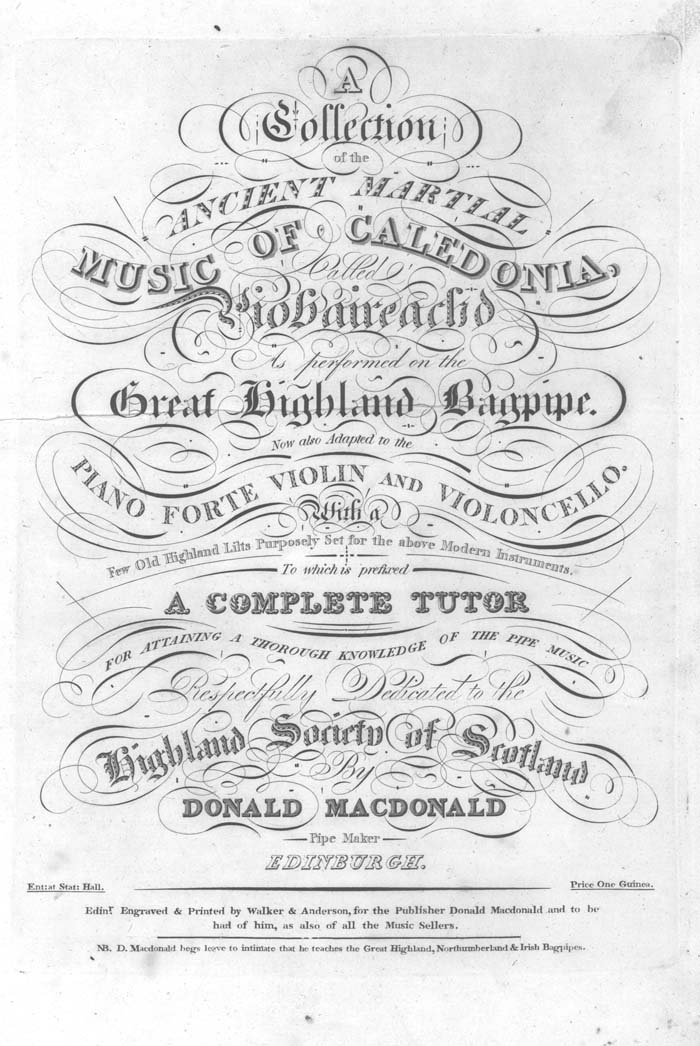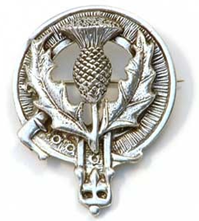 |
The Boatman of Pitnacree
was first published in a pipe setting in Donald
MacDonald's Collection of Quicksteps,
Strathspeys, Reels & Jigs in 1828. Pitnacree
is on the river Tay, about four miles north east
of Aberfeldy. Donald
MacDonald was born around 1750 in Skye. Both he
and his father, John, had learned to play the
bagpipes from the MacArthurs, pipers to the
MacDonalds on Skye.
Donald served during the
Napoleonic Wars in both the Caithness
Highlanders and the Argyllshire Militia,
volunteer militias, as a piper. He spent many
years deployed to Ireland, mainly in the south.
During this time, he regularly took part in
recruiting parties as a piper. He also
eventually became Pipe Major of the Argyllshire
Highlanders.
Donald would take part in
competitions sponsored by the Highland Society,
whose president was the Colonel in Chief of the
Caithness Highlanders. He placed third in 1801,
second in 1811, and took first in 1817. He was
about 50 years old and his prize for winning was
a set of Prize Pipes. At the time these were
usually the best set of bagpipes available.
Donald MacDonald started
making bagpipes and other musical instruments in
the periods between his deployments. He
eventually set up shop in Edinburgh, at the top
of High Street. He was known for making Highland
bagpipes as well as Northumbrian and Irish
bagpipes and other military band instruments. He
also spent time to collecting and studying
bagpipe tunes.
Joseph MacDonald published
his Compleat Theory of the Scots Highland
Bagpipe in 1760. Even with that, there was
no standard system for writing bagpipe tunes
down. The Highland Society of London would give
prizes to pipers who could produce written
copies of tunes. Donald MacDonald won five
guineas in 1806 for his settings.
While Donald was not the
first person to write bagpipe music down, he is
responsible for most of the standardizations
still used today. He continued the tradition of
starting the bagpipe scale on low A, rather than
C that most other people were using. He was the
first to start writing all melody notes with the
tails pointed down and all grace notes with the
tails pointed up. This clearly separated the two
types of notes and made the music easier to
read. |
|
Donald MacDonald's published A
Collection of the Ancient Martial Music of Caledonia in 1820.
This book contained 23 piobaireachds and 24 jigs, reels, airs,
and strathspeys and is considered the first book of tunes
exclusively for the Highland bagpipe. In 1828, he published a
second volume, A Collection of 119 Quicksteps, Strathspeys
Reels and Jigs.
The Highland Society of London appointed
Donald MacDonald as their pipe maker in 1832. This was one of
the best endorsements a maker could get at the time. It is
believed that it was MacDonald who standardized the
measurements, bores, and configuration of the three-drone
Highland bagpipe we play today. His pipes were awarded as prizes
for several years, with one set going to Angus MacKay in 1835.
Donald MacDonald died in poverty in 1840.
He left behind two widowed daughters and four grandchildren. His
three sons had died before him. Much of his work has been
overshadowed by the work of Angus MacKay, who published the
classic work A Collection of Ancient Piobaireachd in
1839. This is still held in high esteem by many pipers.
Before he died, Donald was working on
another manuscript of piobaireachd music. The unpublished
manuscript contained 49 tunes along with historic notes. This
manuscript was given to one of Donalds students, the grandfather
of Major-General C.S. Thomason. It eventually made its way to
Thomason in India and became one of the main sources for his
book.
The works of Donald MacDonald most likely
saved much of the Highland music that was in danger of being
lost. He inspired others to continue the collection and
publication of ancient piobaireachd. It may have taken more than
100 years, but for the last 30, Donald MacDonald's work is
memorialized in the annual Donald MacDonald Memorial Quaich
competition where pipers perform MacDonald's settings of
piobaireachd. His contributions were invaluable to bagpiping as
we know it today.

|



